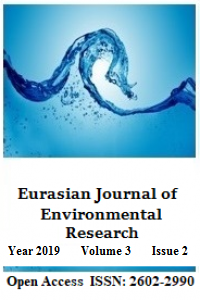Abstract
References
- Alp, K. (2011). Atıktan türetilmiş yakıt. In ÇOB 2011 Atık Yönetimi Sempozyumu.
- Altun, Ş. (2014). Tekstil Uretim ve Kullanim Atiklarinin Geri Kazanimi Cevresel ve Ekonomik Etkileri. Retrieved from http://usaktso.org/dosya/Kurumsal/Trk_Teks_Ger_Don.pdf
- Bölükbaş, A., & Akıncı, G. (2018). Solid waste composition and the properties of biodegradable fractions in Izmir City, Turkey: an investigation on the influencing factors. Journal of Environmental Health Science and Engineering, Vol. 16, No. 2, pp. 299–311. http://doi.org/10.1007/s40201-018-0318-2
- Dahlbo, H., Aalto, K., Eskelinen, H., & Salmenperä, H. (2017). Increasing textile circulation—Consequences and requirements. Sustainable Production and Consumption, Vol. 9, pp. 44–57. http://doi.org/10.1016/j.spc.2016.06.005
- Eser, B., Celik, P., Cay, A., & Akgumus, D. (2016). Sustainability and Recycling Opportunities in the Textile and Apparel Sector. Tekstil ve Mühendis, Vol. 23, No. 101, pp. 44–60. http://doi.org/10.7216/1300759920162310105
- Kozak, M. (2010). Tekstil Atıkların Yapı Malzemesi Olarak Kullanım Alanlarının Araştırılması. Electronic Journal of ConstructionTechnologies, Vol. 6, No. 1, pp. 62–70.
- Official Journal (o.j). The Statement on Refuse Derived Fuel, Additional Fuel and Alternative Raw Materials (2017). Retrieved from http://www.resmigazete.gov.tr/eskiler/2017/04/20170413-4.htm
- Sarc, R., & Lorber, K. E. (2013). Production, quality and quality assurance of Refuse Derived Fuels (RDFs). Waste Management, Vol. 33, No. 9, pp. 1825–1834. http://doi.org/10.1016/j.wasman.2013.05.004
- Xu, C. ke, Cheng, H., Liao, Z., & Hu, H. (2019). An account of the textile waste policy in China (1991–2017). Journal of Cleaner Production, Vol. 234, pp. 1459–1470. http://doi.org/10.1016/j.jclepro.2019.06.283
Abstract
The increase in the world
population and the improvement in living standards have led to a significant
increase in textile consumption and thus textile production in recent years.
Hence the amount of textile wastes generated has been increased. Some of these
textile wastes are sold to scrap dealers for recycling, and some of them are
thrown away or burned. 4.37% of the amount of industrial solid waste produced
in Turkey are the wastes of the textile and cloth manufacturing. Recycling of
textile materials can be applied only if the product consists of a single
material. However, most of the products in the market are produced by mixing
the fibers in order to provide different properties to the product. Hence
textile wastes can be used to produce “Refuse Derived Fuel (RDF)”, which is
developed for the purpose of using solid waste in the energy production plants
and cement factories as fuel and/or co-fuel. Within the study, samples from a
textile factory have been taken and the process of separation has been
performed. The water content, calorific value, total chlorine analysis and
heavy metal analysis of the 31 different samples of textile wastes have been
analyzed, and the results have been evaluated according to The Statement on
RDF, Additional Fuel and Alternative Raw Materials and the standards of
European Union. Textile waste is one of the types of waste that can be used in
the production of RDF provided that it meets the necessary conditions.
References
- Alp, K. (2011). Atıktan türetilmiş yakıt. In ÇOB 2011 Atık Yönetimi Sempozyumu.
- Altun, Ş. (2014). Tekstil Uretim ve Kullanim Atiklarinin Geri Kazanimi Cevresel ve Ekonomik Etkileri. Retrieved from http://usaktso.org/dosya/Kurumsal/Trk_Teks_Ger_Don.pdf
- Bölükbaş, A., & Akıncı, G. (2018). Solid waste composition and the properties of biodegradable fractions in Izmir City, Turkey: an investigation on the influencing factors. Journal of Environmental Health Science and Engineering, Vol. 16, No. 2, pp. 299–311. http://doi.org/10.1007/s40201-018-0318-2
- Dahlbo, H., Aalto, K., Eskelinen, H., & Salmenperä, H. (2017). Increasing textile circulation—Consequences and requirements. Sustainable Production and Consumption, Vol. 9, pp. 44–57. http://doi.org/10.1016/j.spc.2016.06.005
- Eser, B., Celik, P., Cay, A., & Akgumus, D. (2016). Sustainability and Recycling Opportunities in the Textile and Apparel Sector. Tekstil ve Mühendis, Vol. 23, No. 101, pp. 44–60. http://doi.org/10.7216/1300759920162310105
- Kozak, M. (2010). Tekstil Atıkların Yapı Malzemesi Olarak Kullanım Alanlarının Araştırılması. Electronic Journal of ConstructionTechnologies, Vol. 6, No. 1, pp. 62–70.
- Official Journal (o.j). The Statement on Refuse Derived Fuel, Additional Fuel and Alternative Raw Materials (2017). Retrieved from http://www.resmigazete.gov.tr/eskiler/2017/04/20170413-4.htm
- Sarc, R., & Lorber, K. E. (2013). Production, quality and quality assurance of Refuse Derived Fuels (RDFs). Waste Management, Vol. 33, No. 9, pp. 1825–1834. http://doi.org/10.1016/j.wasman.2013.05.004
- Xu, C. ke, Cheng, H., Liao, Z., & Hu, H. (2019). An account of the textile waste policy in China (1991–2017). Journal of Cleaner Production, Vol. 234, pp. 1459–1470. http://doi.org/10.1016/j.jclepro.2019.06.283
Details
| Primary Language | English |
|---|---|
| Subjects | Environmental Engineering |
| Journal Section | Articles |
| Authors | |
| Publication Date | December 1, 2019 |
| Submission Date | September 18, 2019 |
| Published in Issue | Year 2019 Volume: 3 Issue: 2 |
Cite
Creative Commons License
Attribution-NonCommercial-ShareAlike 4.0 International (CC BY-NC-SA 4.0)

Creative Commons Attribution-NonCommercial-ShareAlike (CC BY-NC-SA) License lets others remix, tweak, and build upon the work non-commercially, as long as they credit the author(s) and license their new creations under the identical terms.


